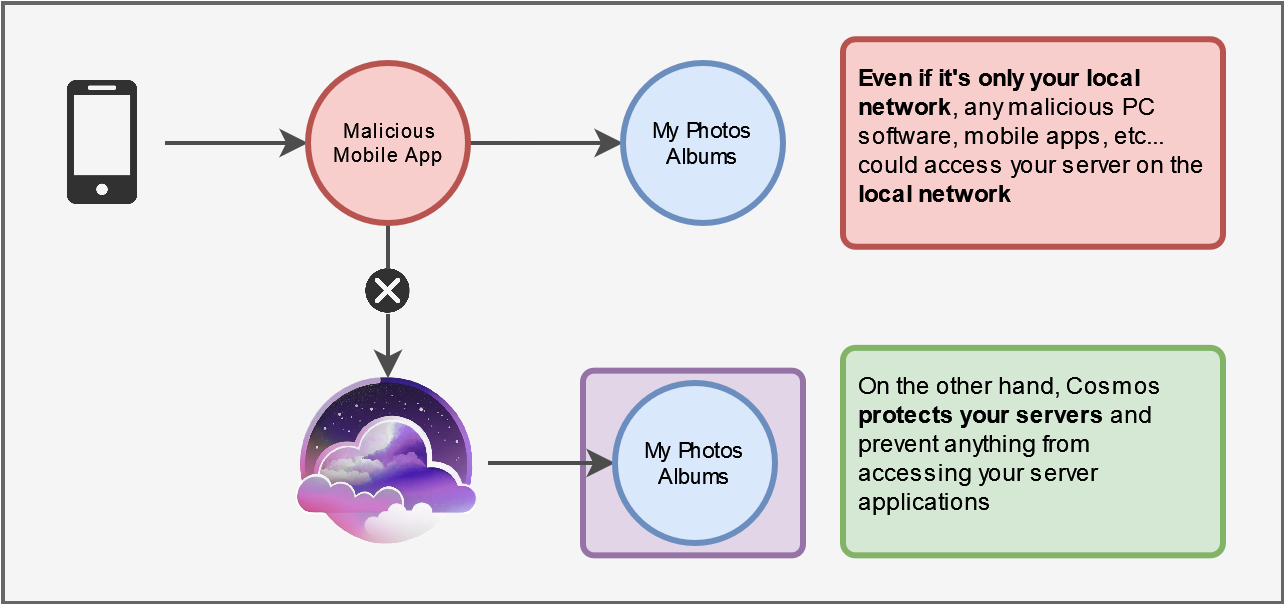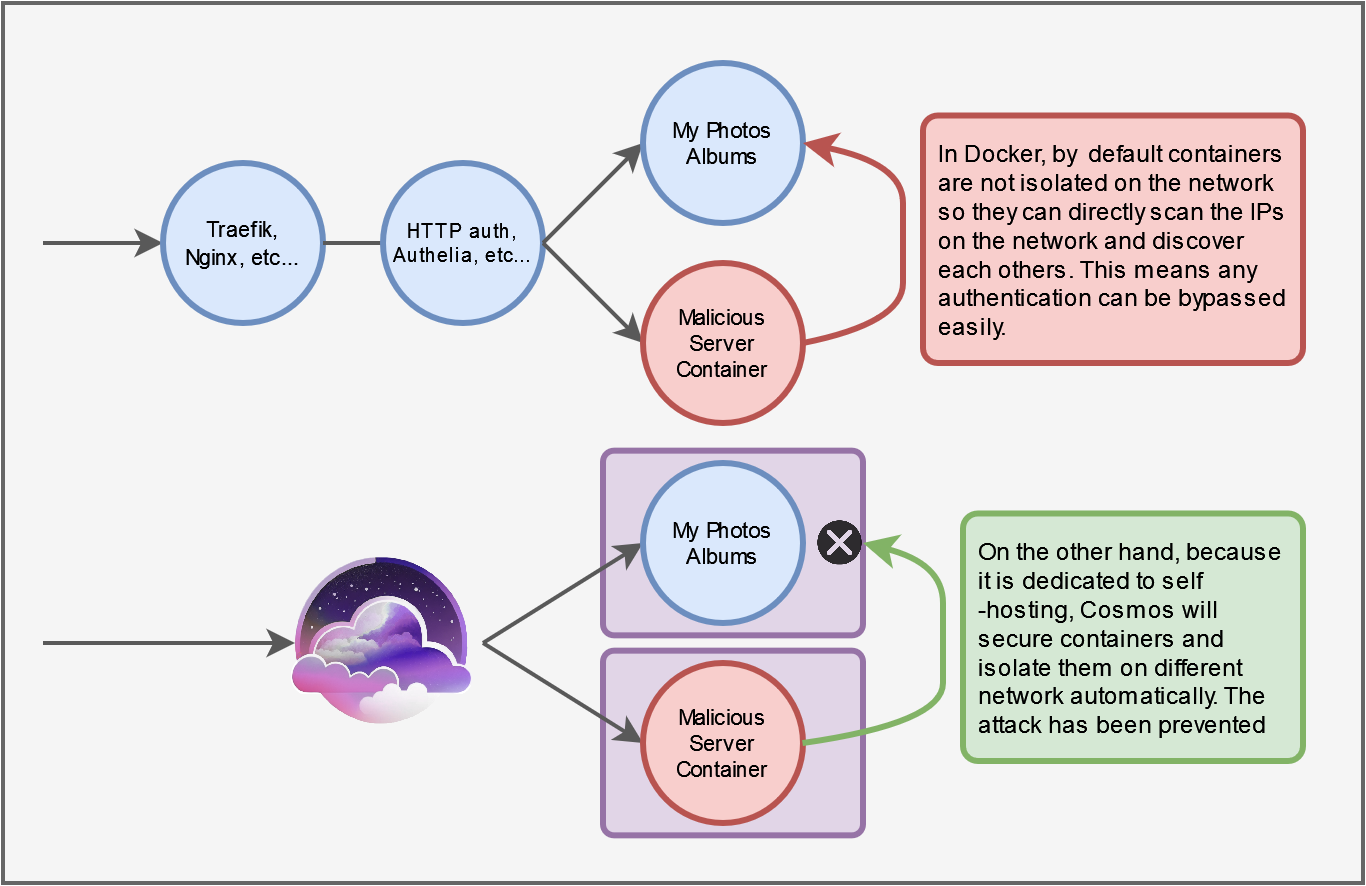| .circleci | ||
| .github | ||
| client | ||
| icons | ||
| src | ||
| .dockerignore | ||
| .gitignore | ||
| .nvmrc | ||
| banner.jpg | ||
| banner.png | ||
| build.arm64.sh | ||
| build.sh | ||
| changelog.md | ||
| cosmos_gray.png | ||
| diag_SN.png | ||
| diag_SN2.png | ||
| docker.arm64.sh | ||
| docker.sh | ||
| dockerfile | ||
| dockerfile.arm64 | ||
| go.mod | ||
| go.sum | ||
| LICENCE | ||
| Logo.png | ||
| package-lock.json | ||
| package.json | ||
| readme.md | ||
| schema.png | ||
| screenshot1.png | ||
| sponsors.js | ||
| tag.js | ||
| test-server.js | ||
| vite.config.js | ||
Thanks to the sponsors:
Cosmos is a self-hosted platform for running server applications securely and with built-in privacy features. It acts as a secure gateway to your application, as well as a server manager. It aims to solve the increasingly worrying problem of vulnerable self-hosted applications and personal servers.
Whether you have a server, a NAS, or a Raspberry Pi with applications such as Plex, HomeAssistant or even a blog, Cosmos is the perfect solution to secure them all. Simply install Cosmos on your server and connect to your applications through it to enjoy built-in security and robustness for all your services, right out of the box.
- Easy to use 🚀👍 to install and use, with a simple web UI to manage your applications from any device
- User-friendly 🧑🎨 For both new and experienced users: easily integrates into your existing home server, the already existing applications you have, and the new ones you want to install
- SmartShield technology 🧠🛡 Automatically secure your applications without manual adjustments (see below for more details)
- Secure Authentication 👦👩 Connect to all your applications with the same account, including strong security and multi-factor authentication
- Latest Encryption Methods 🔒🔑 To encrypt your data and protect your privacy. Security by design, and not as an afterthought
- Reverse Proxy 🔄🔗 Reverse Proxy included, with a UI to easily manage your applications and their settings
- Automatic HTTPS 🔑📜 certificates provisioning with Certbot / Let's Encrypt
- Anti-Bot 🤖❌ Collection of tools to prevent bots from accessing your applications, such as common bot detection, IP based detection, and more
- Anti-DDOS 🔥⛔️ Additional protections such as variable timeouts/throttling, IP rate limiting and geo-blacklisting
- Proper User Management 🪪 ❎ to invite your friends and family to your applications without awkardly sharing credentials. Let them request a password change with an email rather than having you unlock their account manually!
- Container Management 🐋🔧 to easily manage your containers and their settings, keep them up to date as well as audit their security. Includes docker-compose support!
- Modular 🧩📦 to easily add new features and integrations, but also run only the features you need (for example No docker, no Databases, or no HTTPS)
- Visible Source 📖📝 for full transparency and trust
And a lot more planned features are coming!
What is the SmartShield?
SmartShield is a modern API protection package designed to secure your API by implementing advanced rate-limiting and user restrictions. This helps efficiently allocate and protect your resources without manual adjustment of limits and policies.
Key Features:
- Dynamic Rate Limiting ✨ SmartShield calculates rate limits based on user behavior, providing a flexible approach to maintain API health without negatively impacting user experience.
- Adaptive Actions 📈 SmartShield automatically throttles users who exceed their rate limits, preventing them from consuming more resources than they are allowed without abruptly terminating their requests.
- User Bans & Strikes 🚫 Implement temporary or permanent bans and issue strikes automatically to prevent API abuse from malicious or resource-intensive users.
- Global Request Control 🌐 Monitor and limit with queues the total number of simultaneous requests on your server, ensuring optimal performance and stability.
- User-based Metrics 📊 SmartShield tracks user consumption in terms of requests, data usage, and simultaneous connections, allowing for detailed control.
- Privileged Access 🔑 Assign privileged access to specific user groups, granting them exemption from certain restrictions and ensuring uninterrupted service even durin attacks.
- Customizable Policies ⚙️ Modify SmartShield's default policies to suit your specific needs, such as request limits, time budgets, and more.
Why use Cosmos?
If you have your own self-hosted data, such as a Plex server, or may be your own photo server, you expose your data to being hacked, or your server to being highjacked (even on your local network!).
It is becoming an important threat to you. Managing servers, applications and data is very complex, and the problem is that you cannot do it on your own: how do you know that the server application where you store your family photos has a secure code? it was never audited.
Even a major application such as Plex has been hacked in the past, and the data of its users has been exposed. In fact, the recent LastPass leak happened because a LastPass employee had a Plex server that wasn't updated to the last version and was missing an important security patch!
That is the issue Cosmos Server is trying to solve: by providing a secure and robust way to run your self-hosted applications, you can be sure that your data is safe and that you can access it without having to worry about your security.
Here's a simple example of how Cosmos can help you:
Another example:
Additionally, because every new self-hosted applications re-implement crucial systems such as authentication from scratch everytime, the large majority of them are very succeptible to being hacked without too much trouble. This is very bad because not only Docker containers are not isolated, but they also run as root by default, which means it can easily be used to offer access to your entire server or even infrastructure.
Most tools currently used to self-host not specifically designed to be secure for your scenario. Entreprise tools such as Traefik, NGinx, etc... Are designed for different use-cases that assume that the code you are running behind them is trustworthy. But who knows what server apps you might be running? On top of that, a lot of reverse-proxies and security tools lock important security features behind 3 to 4 figures business subscriptions that are not realistic for selfhosting.
If you have any further questions, feel free to join our Discord!
Disclaimer: Cosmos is still in early Alpha stage, please be careful when you use it. It is not (yet, at least ;p) a replacement for proper control and mindfulness of your own security.
Let's Encrypt
Cosmos Server can automatically generate and renews HTTPS certificates for your applications using Let's Encrypt. It is compatible with wildcard certificates, using the DNS challenge. In order to do it, you need to add DNSChallengeProvider to the HTTPConfig in your config (or in the UI). And then add the proper API token via environment variables. To know what providers are supported and what environment variable they need, please refer to this page.
As A Developer
If you're a self-hosted application developer, integrate your application with Cosmos and enjoy secure authentication, robust HTTP layer protection, HTTPS support, user management, encryption, logging, backup, and more - all with minimal effort. And if your users prefer not to install Cosmos, your application will still work seamlessly.
Authentication is very hard (how do you check the password match? What encryption do you use? How do you store tokens? How do you check if the user is allowed to access the application?). Cosmos Server provides a secure authentication system that can be used by any application, and that is easy to integrate.
Installation
Installation is simple using Docker:
docker run -d -p 80:80 -p 443:443 --name cosmos-server -h cosmos-server --restart=always -v /var/run/docker.sock:/var/run/docker.sock -v /:/mnt/host -v /var/lib/cosmos:/config azukaar/cosmos-server:latest
Once installed, simply go to http://your-server-ip and follow the instructions of the setup wizard.
make sure you expose the right ports (by default 80 / 443). It is best to keep those ports intacts, as Cosmos is meant to run as your reverse proxy. Trying to setup Cosmos behind another reverse proxy is possible but will only create headaches.
You also need to keep the docker socket mounted, as Cosmos needs to be able to manage your containers.
you can use latest-arm64 for arm architecture (ex: NAS or Raspberry).
Finally, if you are using Cosmos from one of the countries considered "high risk," you can prevent Cosmos from blocking your IP by adding the following environment variable to your Docker run command: -e COSMOS_SERVER_COUNTRY=IN. Replace "IN" with your country code. The following countries are blocked by default: China (CN), Russia (RU), Turkey (TR), Brazil (BR), Bangladesh (BD), India (IN), Nepal (NP), Pakistan (PK), Sri Lanka (LK), Vietnam (VN), Indonesia (ID), Iran (IR), Iraq (IQ), Egypt (EG), Afghanistan (AF), and Romania (RO). Please note that this choice is neither political nor personal; it is solely based on past attack statistics. If you are from one of these countries and want to use Cosmos, we sincerely apologize for the inconvenience. If you are having issues with this, please contact us on Discord!
You can tweak the config file accordingly. Some settings can be changed before end with env var. see here.
if you are having issues with the installation, please contact us on Discord!






